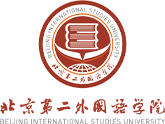
From May 14 to 21, Ji Jinbiao, deputy Party secretary of the CPC Beijing International Studies University (BISU) Committee and president of the university, led a delegation to Brazil and Argentina to deepen BISU's educational cooperation and cultural exchanges with Latin America, further expanding academic research partnerships and talent development collabrations with universities in both countries.
The delegation visited 10 universities, including Universidade Estadual Paulista (Unesp), and Chinese embassies, while holding discussions with local alumni.
On May 15, the delegation visited Unesp for discussions with the Executive Vice President César Martins on cooperation in humanities and social sciences. They also promoted BISU's 'Chinese + Tourism' programs, master's programs, and summer courses.
On the same day, the delegation also visited Universidade de São Paulo(USP), where they held discussions with Professor Adrián Pablo Fanjul, dean of the Faculty of Philosophy, Languages and Literature, and Human Sciences. Zhang Ke, deputy dean of BISU's School of European Studies, signed a school-level academic cooperation agreement with his counterpart at USP.
During meetings at the Chinese Consulate General in São Paulo, Consul General Yu Peng highly praised BISU's achievements in cultural exchanges and expressed his support for further cooperation between BISU and Brazilian universities.
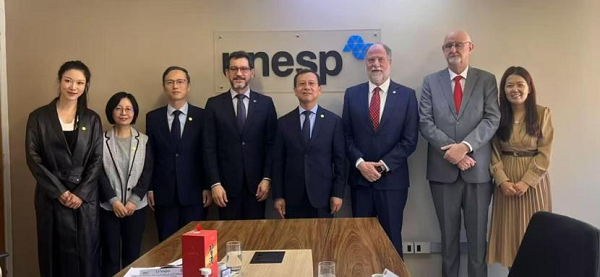
The delegation visits Unesp on May 15.
On May 16, the delegation met with Professor Fr. Anderson Antonio Pedroso, S.J., president of the Pontifical Catholic University of Rio de Janeiro. They discussed collaborating on a 2+2 dual-degree program and innovative educational models. Ji and Professor Pedroso signed a cooperation agreement, officially relaunching the exchange student program between the two sides.
On the same day, the delegation visited the Universidade Federal do Rio de Janeiro (UFRJ). The two universities extensively discussed potential areas of cooperation in literature, economics, communication, and reached preliminary cooperation intentions.
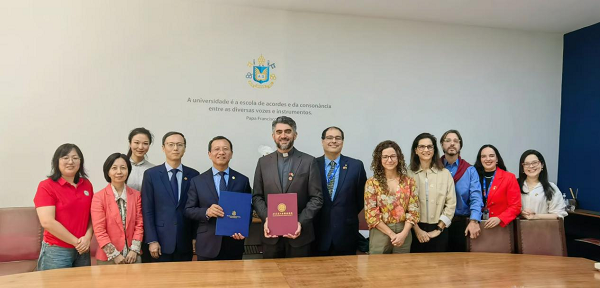
The delegation visits the UFRJ on May 16.
On May 17, the delegation visited the Confucius Institute at UFRJ, holding discussions with Chinese and foreign deans and teachers, observing the preparations for the "Chinese Bridge" competition, and exchanging experiences in cultural promotion.
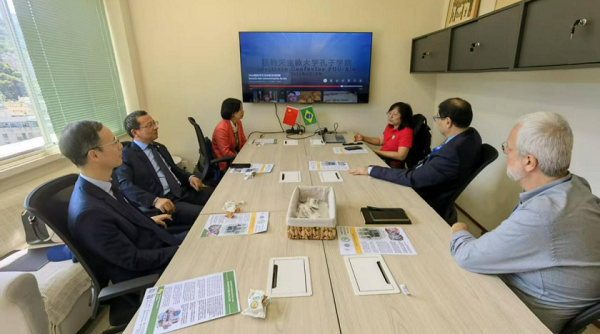
The delegation visits the Confucius Institute at UFRJ on May 17.
On May 18, the delegation discussed new directions for higher education cooperation between China and Argentina with Rodrigo Herrera Bravo, chairman of the Fundación Diálogos Estratégicos.
Ji affirmed the foundation's contributions to China-Argentina exchanges and hoped that both sides would deepen their ties in higher education, cultural engagement, and scientific research. This cooperation will elevate bilateral relations to new heights, fostering enhanced friendship between the two nations.
Later that day, the delegation visited the Chinese Embassy in Argentina. Ambassador Wang Wei introduced the economic and social situation of Argentina and the characteristics of its cultural and educational fields to the delegation, expressing strong support for various forms of cooperation between BISU and Argentine universities.
During the visit, Ji and his delegation held discussions with BISU's Argentine alumni, aiming to further expand opportunities for internships for BISU's students in Argentina. Additionally, alumni at the meeting provided suggestions for enhancing BISU's international influence.
On May 19, the delegation explored innovative programs at the Universidad Nacional de La Plata, including joint master's and doctoral programs, the integration of artificial intelligence into professional courses, and featured programs like "Chinese +". The two sides reached consensus on signing future cooperation agreements.
Additionally, the delegation met with Professor Graciela Morgade, deputy dean of the faculty of philosophy and letters at the Universidad de Buenos Aires (UBA), to discuss enriching cultural and educational exchanges between China and Latin America in detail.
BISU's School of European Studies signed a framework agreement and student exchange agreement with the faculty.
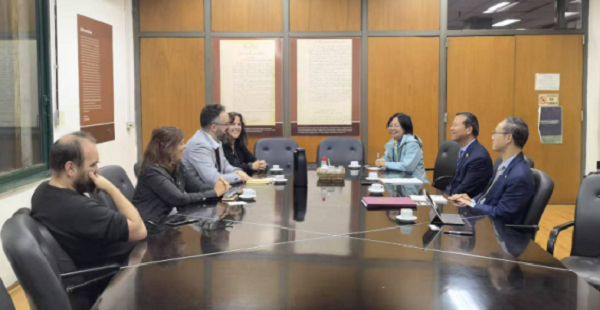
The delegation visits UBA on May 19.
This visit coincided with the holding of the Fourth Ministerial Meeting of the China-Community of Latin American and Caribbean States Forum, injecting fresh vitality into deepening China-Latin America relations and implementing the outcomes of the meeting through educational cooperation. It demonstrated the unique role of universities in promoting mutual learning and building a community of shared future for China and Latin America, laying a solid foundation for future bilateral education, cultural, and scientific cooperation.

Links
